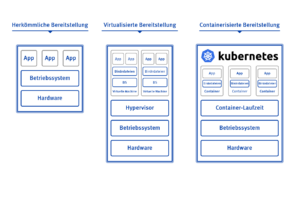What is Kubernetes?
Have you heard of Kubernetes but don’t know exactly what it is? Don’t worry, you’re not alone.
This powerful and revolutionary platform is often a closed book for people without IT knowledge. In this article, you will get a simple and understandable introduction to Kubernetes and then understand why it is considered the leading tool for managing container applications today. We’ll look at the basics of Kubernetes and how it has changed our digital world.
Introduction to Kubernetes
Kubernetes is an open-source software developed for the management of container-based applications in the cloud. But what is a container? Containers allow software developers to package their applications into small, isolated units, which makes it much easier to deploy and scale complex applications. A container is a completely independent execution environment for an application and contains everything the application needs to run.
In addition to the program code, this also includes the necessary runtime environment, the operating system libraries, the configuration files and all environment variables. Kubernetes takes care of distributing the containers to many servers, scaling them automatically and updating them as required.
The containers are created by so-called container runtime engines, such as “Docker”.
Orchestration of applications
Kubernetes can be thought of as a kind of conductor for computer programs. If you have many containers or pods, Kubernetes ensures that they work together correctly.
This multitude of pods behaves like the musicians in an orchestra performing a concert together. In our example, Kubernetes is the conductor that ensures that the musicians in the orchestra are used at the right time and play together perfectly to achieve the desired result.
The history of Kubernetes
This revolutionary container orchestration system was developed by Google in 2014 to simplify the management of containers in a Docker environment. The name “Kubernetes” comes from the Greek and means “pilot” or “ruler”. Today, Kubernetes is one of the most widely used platforms for container management and orchestration. However, there are other providers, such as Docker Swarm or Mesos.
Basic concepts of Kubernetes
To be able to use the platform optimally, it is important to understand the basic concepts of Kubernetes.
One of these concepts is clusters. Clusters are groups of servers on which the containers are executed to ensure high availability and scalability of the applications.
Pods are another concept. Pods are the smallest executable units that consist of one or more containers and are executed within the cluster.
Containers are at the heart of Kubernetes. They isolate applications from each other and from the environment in which they are executed.

Advantages of Kubernetes: scalability, flexibility and high availability
Kubernetes has become increasingly important due to its scalability, flexibility and high availability.
One of the biggest advantages is the ability to scale containers quickly. With Kubernetes, applications can be scaled up almost indefinitely when demand increases and scaled down again when demand decreases.
The flexibility also means that Kubernetes can be used in almost any cloud or on-premise environment, and applications can be moved seamlessly between the different infrastructures.
Thanks to Kubernetes, the availability of applications remains high even if individual nodes in the cluster fail.
Kubernetes is orchestrated by defining so-called pod objects, which contain one or more containers. These pods can then be grouped into deployment objects that comprise a complete application.
Kubernetes enables seamless resource balancing and ensures the high availability and scalability of applications. It also offers rollouts, rollbacks and updates that allow users to make stable changes to the application without affecting functionality. Overall, Kubernetes is a powerful tool for automating and simplifying the orchestration of applications.
Tips for the effective use of Kubernetes in production
The implementation of Kubernetes is an important step in the automation of workflow processes in companies. The success of using Kubernetes effectively depends on how well the clusters are configured and managed. Careful planning of application limits, monitoring and scaling within Kubernetes clusters enables smooth operation and efficient resource utilization.
Another important aspect is to perform regular audits and security checks to ensure that the Kubernetes cluster is protected from threats. By taking these tips into account, companies can optimize their Kubernetes implementation and build a robust, reliable and scalable application infrastructure.
Summary
Kubernetes has without a doubt revolutionized the world of container orchestration. It’s more than just a tool, it’s a game-changer for companies and developers alike. From its humble beginnings at Google to widespread adoption by industry giants, Kubernetes has proven to be the preferred choice for managing and deploying applications in a fast-paced and dynamic environment. We hope this article has given you a solid understanding of what Kubernetes is and how it can benefit your organization.
Links
Create your own virtual data center with Anexia →
Software development with Anexia →